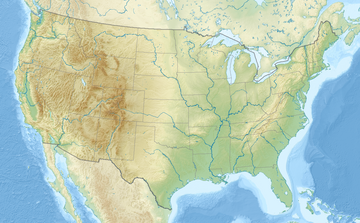Lake Somerville State Park and Trailway is an 8700-acre state park located in Lee County and Burleson County, Texas on the shore of Lake Somerville. The park is a complex of four units; Lake Somerville State Park-Birch Creek Unit, Lake Somerville State Park-Nails Creek Unit, Somerville Trailway and Somerville Public Hunting Land.[2] The park opened in 1970 and is managed by the Texas Parks and Wildlife Department (TPWD)
| Lake Somerville State Park & Trailway | |
|---|---|
 The Family Fishing Pond at the Nails Creek Unit | |
Location of Lake Somerville State Park in Texas | |
| Location | Lee County and Burleson County, Texas |
| Nearest city | Burton |
| Coordinates | 30°17′27″N 96°40′2″W / 30.29083°N 96.66722°W |
| Area | 8,700 acres (35 km2) |
| Established | 1970 |
| Visitors | 150,067 (in 2022)[1] |
| Governing body | Texas Parks and Wildlife Department |
History
editArchaeological surveys place aboriginal hunter-gatherer groups in the area generally between ca. A.D. 900-1800 and Caddo people after A.D. 1400.[3]
The United States Army Corps of Engineers started the construction of Lake Somerville in June 1962. Impoundment of water commenced in January 1967. The lake has an 85 mi (137 km) shoreline and occupies an area of 11,630 acres (4,710 ha). Its main purposes are flood control, municipal water supply and recreation. TPWD leased land along the lake in 1968 from the federal government opened the park in 1970. TPWD manages the Somerville Public Hunting Land under a license agreement and in cooperation with the Corps of Engineers.[4]
Nature
editAnimals
editAnimals in the park include white-tailed deer, fox, coyote, bobcat, North American river otter, raccoon, American alligator, rabbit, six-lined racerunners, cottonmouth and nine-banded armadillo.[5]
Birding is a special draw for the park. Killdeer, turkey vulture, black vulture, northern cardinal, common grackle northern mockingbird and blue jay are common in the park.[6] Sandhill cranes, egrets, herons, white-faced ibis, American white pelican, grebes, cormorants, and a variety of ducks are documented in the wetlands. In the colder months, keep an eye out for wintering bald eagles and migrating osprey.
Anglers might catch white bass, crappie, largemouth bass and catfish.[7]
Flora
editTrees in the park include live oak, post oak, water oak, yaupon holly, and hickory. Other plants found are little bluestem and wild grape. In the spring bluebonnets, Indian paintbrush, pink evening primrose, phlox, and winecups bloom. Branched blazing star, woodland spider-lily and buttonbush show up in the summer.
Activities
editCanoeing, hiking, cycling and horseback riding are available in the park. The park is equestrian friendly with some campsites having horse pens and hitching posts. Many trails are multi-use and designated for horseback riding as well as mountain biking and hiking. A favorite among trail enthusiasts is the Somerville Trailway, a 13-mile multi-use trail.[5]
See also
editReferences
edit- ^ Christopher Adams. "What is the most visited state park in Texas? Here's the top 10 countdown". KXAN.com. Retrieved November 21, 2023.
- ^ Pohl, Eric W. "By Lake and by Land". Texas Highways. Texas Department of Transportation. Retrieved June 12, 2023.
- ^ Perttula, Timothy K. "Aboriginal Ceramic Wares from Sites in the Yegua Creek Drainage of the Brazos River Basin, East Central Texas" (PDF). Journal of Northeast Texas Archaeology. Retrieved June 12, 2023.
- ^ "Lake Somerville State Park & Trailway: History". Texas Parks and Wildlife Department. Retrieved June 12, 2023.
- ^ a b Gfeller, Larry. "Back Roads Nature–Lake Somerville State Park". Texas Master Naturalist. Texas A&M University. Retrieved June 13, 2023.
- ^ "Birds of Lake Somerville State Park" (PDF). Texas Parks and Wildlife Department. Retrieved June 13, 2023.
- ^ "Lake Somerville State Park & Trailway: Nature". Texas Parks and Wildlife Department. Retrieved June 13, 2023.

